We’ve got a lot of ground to cover, friends. Since some of you are quarantining or at least trying not to be out and about much, you may have some time to settle in and read this loquacious BookNotes. Believe me, it’s been long in coming. I’ve literally shed tears over my inability to get this information about books to you.
We actually have stacks of some of these titles that have been sitting here, as if mocking me, since March or April. Many we ordered (shall we say) extras of, in months previous anticipating selling them at this or that event in the Spring, to this gathering or that conference or yet another retreat or off-site bookselling gig. We’ve lost nearly half our income by losing all these on-the-road Borger bookmobile extravaganzas. The books are here. And we’re still closed for in store browsing here at the shop.
We are doing lots of curbside pickup and outdoor book selling in the yard behind the shop. If you’re in central PA, give us a ring — we’d love to visit, with masks, out by our rear parking area.
Please call us at 717-246-3333.
If you are farther away or can’t get out — no worries. You can send us an order for any of these books now (just click on the ORDER link at the end of this column) and tell us what you want and how you want them sent. We’ll get them out at our our sale prices right away.
For those authors who are friends of our store, who have sent customers our way to buy your books, we are especially grateful. If we’re going to survive in this new mode, we have to have more readers discover us, and we’re glad for those who are H&M cheerleaders. We wished we could have done more to serve you and your baby. The publishing world is a hot mess right now, and we are grateful for your patience and support.
For now, here are 20 books that I hope you will consider buying. I feel awful for some of the authors and their publishers who did not expect their work to be scuttled under the tragedy of pandemic and mass illness. I’ll admit even now it’s hard to be too exuberant knowing that we have lost over 200,000 of our fellow Americans this past half a year. (And so many more, worldwide!) Yet, despite all, we read on, and we honor these 20 (or more) authors who have worked hard putting their words down for our enjoyment and growth. Let’s support them by buying a few extra books this season. Maybe you could even buy some for those who might not otherwise pick up such titles or who cannot afford them. Seems like a quiet way to improve our world, to contribute to culture, to steward and spread goodness, sowing ideas of grace and beauty, justice and faith. Spread some book love around, y’all. You’ll be glad you did.
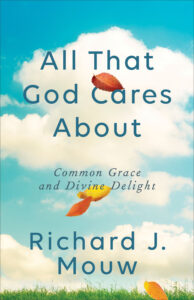 All That God Cares About: Common Grace and Devine Delight Richard J. Mouw (Baker Academic) $21.99 – OUR SALE PRICE = $17.59
All That God Cares About: Common Grace and Devine Delight Richard J. Mouw (Baker Academic) $21.99 – OUR SALE PRICE = $17.59
Well, well. This one is first for a reason. It is one of the few books that actually talk about our bookstore and has a fairly lengthy excerpt of something I once wrote at BookNotes. (“We’re even in a footnote!” I shouted to Beth, book nerd that I am.) If I’m being honest I have to admit how very proud this makes us feel and how honored we are that this world-renowned theologian and writer and global Christian leader chose to focus on a story I told about our own past.
It is a story that Mouw knows a bit about, revolving, in part, around a Dutch Reformed, worldviewish, philosopher/social organizer who inspired young people in Western Pennsylvania in the 1970s, out of which came the now famous Jubilee conference run by the CCO in Pittsburgh (as well as other lasting missions and ministries, such as extraordinary Pittsburgh Urban Christian School.) Dr. Peter J. Steen was the star of my little story that Mouw cited although he is only mentioned in passing. Dr. Mouw knew him from his own career in philosophy in those years (then at Calvin College) and while Mouw isn’t nearly as flamboyant as the energetic and colorful Dr. Steen, they read some of the same books (such as Abraham Kuyper, Herman Dooyeweerd, and Bob Goudzwaard, in Dutch, even) and had a penchant for social analysis that was radical and wide-ranging. They both knew Al Wolters, author of Creation Regained, who perhaps popularized the phrase “reformational” while he was at the Institute for Christian Studies in Toronto, a decidedly neo-Calvinist graduate and PhD institution of higher education. It was Steen that first turned me on to Walter Brueggemann and Peter Berger and it may have been Mouw that first got me interested in John Howard Yoder. And they both read Newbigin early on; they taught on issues like ecological stewardship and Christian political theories and took up the cause of racial justice in concert with a young John Perkins. As conservative Calvinist theologians, neither would have fully approved of the idiosyncrasies of the thought of, say, Brueggemann or Yoder, but they were in those kinds of ecumenical dialogues long before some postmodern-ish emergent church planters took up those authors decades later. Steen’s teaching about the deepest, ultimate concerns that shape one’s life perspective introduced us to the word worldview before any other author or speaker I knew and predicted the insights of the likes of Derrida and other postmodernists who rejected the alleged religious neutrality of autonomous reason.
Just to sort of frame all of this one more time, authors we promote here that you may have heard of who were influenced by this robust teaching about philosophy and the cosmic scope of Christ’s redemption of the likes of Dr. Steen include James K.A. Smith, Calvin Seerveld, Steve Garber, Brian Walsh — each writers that I care about, and who would agree that in one way or another, Steen left a mark in our circles in Western Pennsylvania and which in turn inspired Beth and I to start our ecumenical bookstore in 1982.
Anyway, this renegade philosopher / mentor taught us to think about the Dutch statesman/theologian Abraham Kuyper’s teaching of common grace — that “all truth is God’s truth” as Arthur Holmes used to say — which is a remarkably potent theological doctrine that invites us to be curious about God’s world, to affirm the goodness in many fine things in life, and to appreciate that in which God takes delight, whether those things seem inherently religious or not. It is this doctrine — its controversies and implications, both happy and troubling — that professor Mouw walks us through in this fabulous and wide-ranging book. It is even better than his first fascinating foray into the topic almost 20 years ago, He Shines In All That’s Fair: Culture and Common Grace (Eerdmans; $15.99.)
(I have often said that for many in the mainline and sacramental churches, this common grace stuff goes without saying. By intuition they feel no shame in enjoying sports, R-rated movies, engaging in ordinary civic affairs, reading popular science magazines about evolution. But my, oh my, the grief we might avoid and the faithfulness to God that we could deepen if we could articulate why it is right and good to be fully engaged in ordinary human activities, to break out of the rather lame orientation described by Niebuhr as merely Christ plus culture. Those in more fundamentalist or evangelical congregations, however, have been more leery– or they used to be, at least — of worldly pursuits and trivial social involvments and, again, my oh my, what great joy it could bring, and what freedom, if the doctrine of the goodness of creation and the common grace offer by a righteous Creator, were known, understood, and well articulated. In other words, Mouw’s teaching here is important for most church folks no matter where you are on the denominational or theological spectrum.)
Anyway, we’d truly love it if you ordered All That God Cares About because what Mouw is doing here (besides quoting me, which really isn’t that important, finally) is foundational to why we started Hearts & Minds in the first place. I don’t need to rehearse this matter too much, but it is true that over the last decades what has come to be called “Christian bookstores” are those shops that are known for not carrying classic fiction, for not offering much by way of poetry or the arts, for refusing to carry much about science, let alone environmental science. You know those Christian bookstores that until recently didn’t have a section in the store about race relations; the revivals of concern about injustice over the past 20 years just passed most of them by because the books they carried and the topics they viewed as proper to a regiment of Christian reading were narrow. They were too often constricted by the narrow range of subjects they carried and the largely ultra-conservative perspective they brought when they did curate books on current affairs or social ethics.
Few Christian bookstores — in air quotes, of course, since we are referring to the conservative evangelical Protestant Christian bookstores; Catholic and Epsiopalian stores existed as well, although not well known among many in the popular culture or wider publishing industry — when we first opened dared to stock Catholic books on Anabaptist books or books by mainstream Protestants. We did and do. They had bumper stickers and Jesusy whirligigs, but little on business or work, the arts, farming, or science. They had books by right wing celebrity stars — books by Ollie North justifying his death squads and lying under oath, say — but not many other books about current events. They just didn’t get it that God cared about all of life and that a follower of Jesus should therefore read widely, caring about what God cared about. And — more to the point of Mouw’s book — that we could enjoy the things God seems to enjoy.
Mouw doesn’t talk about any of that bookstore stuff, of course; I just use it as our own illustration of how his theme of common grace informed us early on and why this new study seems so important to me. Mouw’s argument in favor of a broad-mindedness in thinking and a generous willingness to see some good in most things (from ancient Chinese art to secular science to modern sporting events) is rooted in this unique exploration of “divine delight.” Does God care about recreation or art or fashion design? Can part of our daily discipleship include reading secular novels or watching crime shows on TV or being happy about our favorite hockey team? If God cares and even enjoys human activities, then dare we? Or, dare we not?
To say yes to this question bears remarkable consequences, for good and perhaps for ill. Mouw is balanced and careful as he walks us through some deep weeds in one particular theological tradition that has grappled with this idea, but he does it so well and explains its implications so clearly that those of us who are not Dutch or Calvinist (as he is) will still want to follow along, learning from the ups and downs of his own religious denominations and social ministries and debates.
I wish someday to seriously review this marvelous book, chapter by informative chapter. I would love to show why this fascinating theological controversy could add heft to our instinct to “practice the presence of God” and find a sense of the sacred amidst the quotidian occurrences of our daily lives. For now, I can only tell you this backstory of why Beth and I appreciate Mouw’s good work, his celebration of God’s concerns about stuff that goes on beyond the boundaries of the church and we think that those who read BookNotes (that would be you, dear reader) would benefit from reading any of Mouw’s books, but especially this recent one. We like his phrase “common grace” and we like how he explains it (as well as how he explains and replies to the objections some have to it, all that he takes judiciously.) All That God Cares About is theology at its best — readable, interesting, fair, informative, inspiring, and with great, great consequence for how we live, day by day, as God’s own children.
Listen to this:
“Vincent Van Gogh once said, ‘The great thing is to gather new vigor in reality.’ This is exactly what Mouw is doing in All That God Cares About. He is gathering new vigor for our undivided attention to the reality of God’s world. Rather than sludging through the embattled history of the doctrine of common grace in our Calvinian camps, Mouw compels us to apprehend and admire the coruscations of God’s glory shed abroad in this fallen world.” — Tim Blackmon, chaplain, Wheaton College
“God takes delight! Mouw has given many of us the gift of that truth through his writing and speaking and very being! In this clearly written book he engages many thinkers to help us know that redemption is cosmic in scope and to help us appreciate the work of the Holy Spirit beyond the boundaries of the Christian community.”
— Katherine Leary Alsdorf, Global Faith & Work Initiatives, Redeemer City to City
“In this winsome book, Mouw takes readers on an enlightening tour of the theologies of creation, redemption, and eschatology undergirding his hopeful theology of common grace. Irenic but never shy to respond to critique, Mouw gives us a book that will engage and inform readers from a wide range of theological standpoints. A delight to read!”
— J. Todd Billings, Western Theological Seminary
Here is a very short little clip of Mouw delightfully talking about some of these ideas.
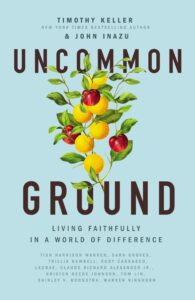 Uncommon Ground: Living Faithfully in a World of Difference Timothy Keller & John Inazu (Thomas Nelson) $25.99 – OUR SALE PRICE = $20.79
Uncommon Ground: Living Faithfully in a World of Difference Timothy Keller & John Inazu (Thomas Nelson) $25.99 – OUR SALE PRICE = $20.79
Several years ago we met Dr. Inazu (author of Confident Pluralism, a University of Chicago title that argues for a profound and respectful structural pluralism, part public etiquette guide and part political theory about how to create just space for all with a high value on religious freedom.) We are fans. We were glad when the famous Manhattan Presbyterian pastor hosted him at Redeemer in New York (and got the books for the gig from us.) This book emerged from their various conversations, inviting evangelical Christians to write about how the navigate the tensions of serving the common good in a world of great difference. These are well written essays, testimonials, stories and arguments for convicted civility, for engaging well in this era of toxic conflict.
There are three parts to this, with four chapters in each: Framing Our Engagement, Communicating Our Engagement, and Embodying Our Engagement. With contributors such as Trillia Newbell, Lacrae, Kristen Deede Johnson, and Rudy Carrasco (not to mention Keller and Inazu) it is hard to pick favorite pieces. I will say, though, that I have read and re-read the chapter by Tish Harrison Warren on being a writer, and loved hearing from singer songwriter Sarah Groves.
I suppose I don’t have to explain how very significant this project is, this 21st century conversation about how to recover a sense of being salty salt and bright light and effective leaven in the loaf. Somehow our churches have become hostile to the watching world or so eager to be seen as not extremist or pushy that we’ve nearly blended into the secular culture with a chameleon faith. These authors tell stores that are both winsome and principled, taking stands but in ways that are gracious and helpful. These are the sorts of people we aspire to be, I think, at our best, thoughtful, intentional, gracious, and innovative, even as we seek to honor God in all we do. Highly recommended.
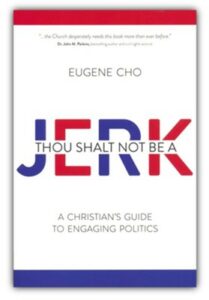 Thou Shalt Not Be a Jerk: A Christian’s Guide to Engaging Politics Eugene Cho (Cook) $17.99 – OUR SALE PRICE = $14.39
Thou Shalt Not Be a Jerk: A Christian’s Guide to Engaging Politics Eugene Cho (Cook) $17.99 – OUR SALE PRICE = $14.39
Speaking of civility, this is one we all need right now (myself included, for sure!) The witty title and the playful cover don’t do this book justice as it is a serious work by a very serious guy. Rev. Cho, formerly a pastor of Quest Church in Seattle, also was the founder of One Day’s Wages, a grassroots movement of people working to alleviate global poverty. This good work led him to his new job, the Executive Director of Bread for the World, the respected citizen’s lobby organization that inspires and equips people of faith to advocate for anti-hunger legislation. Filling the shoes of heros such as BFW founder Arthur Simon and the previous Director, David Beckman, will be daunting for the younger, more hip and evangelical Cho. But if this fun book about civility and building coalitions for the Kingdom of God and just political policies is any indication, Cho is going to lead Bread into a good new future.
This is a fine book (among many these days) that offer a balanced and Biblically-guided vision and a faithful prophetic imagination to move us towards voting in ways that honor God’s own heart for social justice, even as we stay in friendship and fellowship with others who see things differently than we do. Cho’s friend and mentor Dr. John Perkins says “I have been waiting for this book… we need to hear and embody this message!”
 Speaking Peace in a Climate of Conflict Marilyn McEntyre (Eerdmans) $21.99 – OUR SALE PRICE = $17.59
Speaking Peace in a Climate of Conflict Marilyn McEntyre (Eerdmans) $21.99 – OUR SALE PRICE = $17.59
Oh my, I hope you know what a good and captivating writer Ms McEntyre is, the good words she has offered for for us in so many beautiful books. I know I’ve raved often about her Caring for Words in a Culture of Lies and many have simply been transformed by the loveliness of her wise, little Make a List: How a Simple Practice Can Change Our Lives and Open Our Hearts. I have loved her daily devotional called Word By Word and have quoted out loud from her When Poets Pray in talks I have done about the power of books and words and, yes, poems. She is a writer who you should know and who for many is nearly a patron saint. Back before the Spring I ordered a whole case to promote at our upcoming events. You who attend gigs like EAPCE and the UCC clergy convocations and the Episcopal Bishop’s retreat in Cape May and the CCO staff training institute — I was going to tell you all about this, and I figured you’d love it!
Speaking Peace, you see, is not only a guide to civility in our frayed democracy, not only a resource alongside the likes of Richard Mouw’s Uncommon Decency or Arthur Brooks’s book about “the culture of contempt.” In a sense it is closer to the fabulous and insightful How the Body of Christ Talks by C. Christopher Smith. It is less an essay on incivility and the loss of civil discourse, but more, a celebration and manifesto about the power of words. It is about how to use words wisely and well. Drawing on the Biblical line in Colossians 4, it could have been called something like seasoned speech. As Leslie Leyland Fields (herself quite a wordsmith and wise writer) says, “Marilyn McEntyre has been quietly shepherding us toward God’s intention of language as a gift rather than a weapon. She’s done it again.”
As Paula Huston puts it, Speaking Peace is “written with her signature intelligence and poetic flair.” Can we reclaim “the nobility of language and its power to heal”? I assure you, this book will startle you, awaken something within you, and impress you in important ways.
Buy several — please!
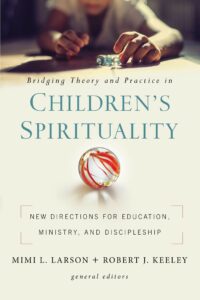 Bridging Theory and Practice in Children’s Spirituality: New Directions for Education, Ministry, and Discipleship edited by Mimi L. Larson & Robert J. Keeley (Zondervan) $22.99 – OUR SALE PRICE = $18.39
Bridging Theory and Practice in Children’s Spirituality: New Directions for Education, Ministry, and Discipleship edited by Mimi L. Larson & Robert J. Keeley (Zondervan) $22.99 – OUR SALE PRICE = $18.39
Every Spring for many, many, years, Beth and I (and, more recently, our oldest daughter Stephanie) have played a role at the annual Eastern APCE Conference — that’s the Association of Presbyterian Church Educators, thanks for asking — and we missed it so badly this year. We miss these humble and often beloved local church educators that love children and adult formation, that study heady stuff about education theory and our social context and broad Reformed theology as it relates to the shelter and nurture of the children of God in the local congregation. We miss their exuberant dedication to children’s books and their love of creativity and their passion for learning. This book, quite simply, would have sold out there, I’m sure of it.
Mim Larson is a professor of Christian formation and ministry at Wheaton, visiting there on loan from her work as children’s ministry catalyzer for Faith Formation Ministries in the Christian Reformed Church. They do very good work and she is a fabulous, respected scholar-practitioner. She has served in the local parish, participated in curriculum development and authors books and book chapters.
Robert Kelley is professor of education at Calvin University (and also teaches discipleship and faith formation at Calvin Theological Seminary.) He wrote Helping Our Children Grow in Faith (Baker Books; $15.00) which we have sold well over the years. He’s a lively teacher and good writer.
Putting the two of these leaders together to edit a cutting edge volume about this shift from scholarship to practice, from theory to embodiment, was a stroke of genius. And they pulled together an extraordinary case to help offer a great resource for anyone serious about influencing a children’s spirituality and faith development. As the publisher’s promise, this book will help us “explore the different contexts and methods” that can help us accomplish this. The blend of practical application and theoretical understanding makes this widely appealing, and we are very glad to tell you about it now.
And what a great array of contributors — including a chapter by John Roberto who had been scheduled to be the keynote speaker for our Eastern APCE event. There are chapters here about racial diversity in children’s faith formation, surveys of different schools of thought and theologies of children’s ministry, good stuff about the role of the family and the role of the church. There is a chapter on childern’s grief, a chapter on play, and an important chapter on what do to about “white” spirituality in children’s curriculum. Bridging Theory and Practice in Children’s Spirituality, unlike some similar anthologies, doesn’t have a bad chapter in it. We hope you’d consider getting one for leaders in the children’s ministry in your church.
(And if you are a long-time APCE friend, what are you waiting for? Pick up the phone or send us an email. You’ve got to have this one!!)
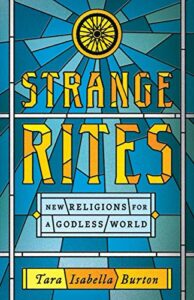 Strange Rites: New Religions for a Godless World Tara Isabella Burton (PublicAffairs) $28.00 – OUR SALE PRICE = $22.40
Strange Rites: New Religions for a Godless World Tara Isabella Burton (PublicAffairs) $28.00 – OUR SALE PRICE = $22.40
This is one of those books that had I had capacity in the hectic times of the most serious shut-down I’d have read and studied and pondered and critiqued. From dipping in I can say for sure that it is an enjoyably written work, remarkable, really. And it is an oddball book that has caught much attention, surprisingly, I think. Ms Burton is clearly on to something here and she invites us into the story with verve and immersive, storytelling genius. Rod Dreher — himself quite a storyteller — says that with this book, “Tara Isabella Burton establishes herself as her generations’s foremost chronicler of American religious life.” And the “religious life” she is exploring is less the Lutheran liturgies or the Methodist services or the Presbyterian prayers or the evangelical worship gatherings, but the “spiritual anarchy” (as Dreher puts it) that is emerging in practices and communities that are replacing classic Christianity. We are, as a people, becoming both more and less religious at the same time. That is something I heard Len Sweet predict decades ago, and now we are swimming in it.
That is, Burton explores stuff like Harry Potter devotes, ideologies of sex, practitioners of magic, the post-new-age wellness movement, and the like, and notes they are still longing for connections and community, forging new kinds of sacred spaces, searching for transcendent meaning. Ahh, if only they’d read Jamies Smith’s On the Road with Saint Augustine, but I digress.
Just listen to these remarks about the importance of this research:
“A bracing tour through the myriad forms of bespoke spiritualism and makeshift quasi-religions springing up across America.”
―The Wall Street Journal
“An essential work for anyone interested in understanding — or addressing — our rapidly transforming cultural and religious landscape.”
―Christianity Today
“A lesser writer and a colder intellect would have been content simply to mock the video-gaming, Soul-Cycling communicants of our “Remixed” Great Awakening. Yet in Strange Rites, Tara Isabella Burton grasps that strangeness entails ecstatic power as well as oddity, and that even folly in search of transcendent meaning merits empathy, not apathy–the difference between a merely lively read and a profound one.”―Giselle Donnelley, Research fellow at the American Enterprise Institute for Public Policy Research
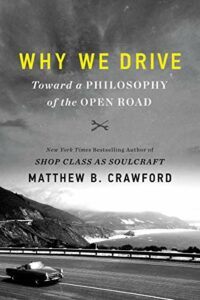 Why We Drive: Toward a Philosophy of the Open Road Matthew B. Crawford (William Morrow) $28.99 – OUR SALE PRICE = $23.19
Why We Drive: Toward a Philosophy of the Open Road Matthew B. Crawford (William Morrow) $28.99 – OUR SALE PRICE = $23.19
Hey, friends, it’s not too late to go for a joy ride and get in on this one — what a fascinating, fun, read for those who are philosophically inclined and who love the open road. I suppose you know by now that Matthew Crawford is an important name, author of two books that are astute and profround and unlike almost anything you’ve ever read. A lot of our smartest customers really like his work a lot.
His first major release was Shop Class as Soulcraft: An Inquiry into the Value of Work (Penguin; $17.00) where he tells the story of being dissatisfied with the feel of pointlessness in his white collar, academic job and how he opened and found joy in his own motorcycle repair shop. That becomes the basis for thinking hard about why we tend to devalue blue collar work these days, why shop classes are on the decline in American schools, and how to ponder more seriously the meaning of education and work. It was, in some ways, the intellectual foundation for much of the contemporary maker movement. It’s still a book we tend to sell a copy or two of almost anywhere we take it.
Crawford’s second important book studied and wrote about workers who are good with their hands. It’s deeper than that, and his exploration of embodied practices — think of a worker trained in the detailed art of repairing large pipe organs or an employee valued because of the “body memory” of what she can naturally do (“without thinking” we say) — has much to offer all of us. These kinds of tasks cannot be mechanized, but in the world of “information science” and automation we are failing to appreciate this deeply human way to be embodied and attentive to the realities of God’s world around us. And so, he wrote the splendid, useful, wise, the World Beyond Your Head: On Becoming an Individual in an Age of Distraction (Farrar, Straus, Giroux; $17.00.) It’s a very good book for all of us, no matter what style of work we do, since we all live in our bodies and in the joys and constraints of God’s real world.
Which brings us to his big, fat, new hardback which is about driving cars. I’m not kidding: if you follow is work, it flows exactly from his other two. As it says on the back:
As we become ever more pacified in so many domains of life, I want to explore this one domain of skill and freedom — driving — before it is too late, and make a case for defending it.
Is he pushing back against what we lose when we give ourselves over to driverless cars? Yes indeed. Is in a bit in the linage of, say, Neil Postman and his Technopoly? Yep. (He has a chapter called “The Diminishing Returns of Idiot-Proofing as a Design Principle” and calls driverless cars a push towards “moral reeducation.”) Does he make tons of fabulous observations about the joy and art and skill of driving, about being out on the highways? Oh yes, what a fun writer he is! Does he along the way do what we Christians might call an idol out of human freedom, about (as he puts it) “autonomy”? Is it a little weird that he calls driving a sort of “humanism.” Yes, yes, yes. But it’s still a helluva book — with lots about the common good and road rage and feeling the road and the DMV and managing traffic, and bikes, too. I can’t wait to read more of it soon. I’m sure you know somebody who would love it.
Crawford writes ecstatically of driving, evoking the sense of release and agency of flooring it out of the city as “a shady country road reels out ahead in rhythmic curves.” … But Why We Drive is about driving like Moby-Dick is about whaling. … Crawford has something important to say.– San Francisco Chronicle
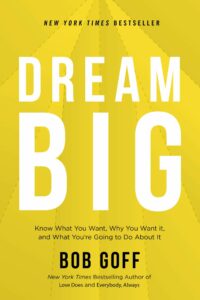 Dream Big: Know What You Want, Why You Want It, and What You’re Going to Do About It Bob Goff (Thomas Nelson) $26.99 – OUR SALE PRICE = $21.59
Dream Big: Know What You Want, Why You Want It, and What You’re Going to Do About It Bob Goff (Thomas Nelson) $26.99 – OUR SALE PRICE = $21.59
What a Springtime it was, with students graduating, college commencements, new seasons for new considerations. I wanted to shout about my own book of graduation speeches for college grads, Serious Dreams: Bold Ideas for the Rest of Your Life but whenever folks were asking about new stuff that would be good gifts for grads in these past months I found my self wanting to tell them about Dream Big that had just come out in early June. I am a big fan of Bob Goff and his books — his last one was the great year-long devotional Live in Grace, Walk in Love that had 365 new Goff stories, each interwoven with a solid Bible teaching. After Love Does and Everybody Always and the newish devo, Bob needed to shift gears just a bit. So many people were asking him how he did what he did — starting schools in war zones, taking phones calls at all hours from around the world, being supportive of great people and their good causes. He started and took on the road a series of “Dream Big” workshops that were whimsical gatherings of upbeat encouragement but also serious coaching to help people take steps to do what they really wanted to do in life. Apparently these retreats were life-changing and helped launch into the world all manner of new resolve to do good stuff.
Dream Big: Know What You Want…, then, is the big-hearted, humorous, faith-infused, practical (well, sometimes practical) visionary guidebook to discerning what one might do to get one with one’s life. To be honest, as one who has helped start up some neat projects and who started a business out of nothing, I am not a fan of most of these breathy, you-can-do-it self help books. I might not have read this if I didn’t know Goff would minister to me as a storyteller who points us to Christ. But ya know what? I loved this. It made me think, helped me ponder some important issues in my own life, and I came away wanting to tell others about it.
Goff is a genius at using inspiring metaphors and examples. In a chapter on “figuring out what is holding you back” he brings up Stockholm Syndrome. He wonders if we are clinging with affection to the very things that are holding us hostage. The chapter is cleverly called “Hostage Negotiation”and I’ve read it three times. He uses an apt image, too, when he tells about a drawer in his house full of keys that they don’t want to discard because they might need them. But, of course, they don’t know what the keys are for, which locks they unlock. (#metoo anyone?) So he reminds us that that box of keys is like the hang-ups in our lives. “They are habits and beliefs and pattersn that may have served us at one point, but don’t any longer. Yet we still hang on to them thinking they might be useful later.” “This,” he says, “is how limiting believe work.”
And then the next chapter is about what he calls “launching beliefs” that, somehow, through God’s grace, most of us also have floating around in our heads and hearts. They have quite a shelf life and he invites us to be aware of what is going on in our interior lives to hurt or help us. I suppose it’s psych 101, but it’s really well put and I think will be helpful for lots of us. To make it clearer, just read the chapter “Pick the Vespa” which is classic Goff and just hilarious.
On the back cover Bob says he invites us not to settle for anything less than following our dreams and discovering our deeper purposes because, he insists, “God thinks you’re worth it.” “We need a path,” he says, “and I hope this book provides on that moves you toward you ambitions.” Are you willing to take steps to figure this out and release some amazing things into the world? Dream Big just might help you, no matter at what age or stage you find yourself. Heck, whether it works or not, it’ll be a blast reading it and you’ll surely be inspired to something reflective and new and maybe even exciting. And you’ll have his phone number, too. Buy the book and call him up. Just tell him I said hi and that I’m still dreaming those serious dreams. And then tell him about your own.
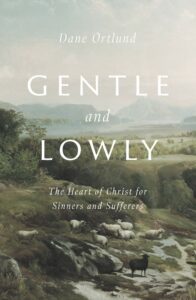 Gentle and Lowly: The Heart of Christ for Sinners and Sufferers Dane Ortlund (Crossway) $19.99 – OUR SALE PRICE = $15.99
Gentle and Lowly: The Heart of Christ for Sinners and Sufferers Dane Ortlund (Crossway) $19.99 – OUR SALE PRICE = $15.99
The textured dust-jacket on this nice hardback immediately feels right and it is good, because this is one of those books that one doesn’t read for new information or a few hours literary pleasure. There very well be new information here and there will be hours of reading enjoyment. But this is a book that feels significant. It feels beautiful. It is a book that — as Paul David Tripp says — “carefully and tenderly displays Christ’s heart.” As Michael Reeves (himself an author of a book on Christ, and another on the Trinity) says “For any feeling bruised, weary, or empty, this is the balm for you.”
Author Dane Ortlund is know in “Gospel Coalition” circles and is the chief publisher at Crossway. Here, he brings his PhD level studies and focuses supremely on this wondrous but beautiful notion: that God’s kindness for us is magnificent, that Christ’s heart is for us, especially when we are weak and broken. It starts with the kind invitation from Jesus, recorded in Matthew 11:28, “Come to me, all who labor and are heavy laden, and I will give you rest.”
You should know that this tender and gentle book is weighty, not trivial and, in fact, draws heavily on a Puritan writer named Thomas Goodwin. Along the way he cites Jonathan Edwards, of course, and even the rare contemporary thinker such as Richard Baukhaum and Jorgen Moltmann, but the book is drenched in the work and vision of the Puritans like Sibbes, Owens, Bunyan, and his beloved Goodwin. If you’ve never spent time with these authors, this is a great introduction to this stream of Christian tradition and we are happy to recommend this.
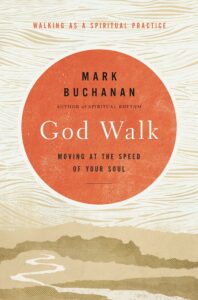 God Walk: Moving at the Speed of Your Soul: Walking as Spiritual Practice Mark Buchanan (Zondervan) $25.99 – OUR SALE PRICE = $20.79
God Walk: Moving at the Speed of Your Soul: Walking as Spiritual Practice Mark Buchanan (Zondervan) $25.99 – OUR SALE PRICE = $20.79
It has been a long time since Mark Buchanan (one of my favorite evangelical wordsmiths) has put paper to pen and released a new book. We still recommend his older books, such as Your God Is Too Safe and we regularly sell his The Rest of God: Restoring Your Soul by Restoring Sabbath (Nelson; $15.99.) I’d suggest him if you want a very fine writer who is thoughtful, serious, but not too stuffy or arcane, maybe like a Eugene Peterson, or even a Max Lucado if Max wrote more deeply, or a less mystical Richard Foster, maybe. So you respect the writing of Philip Yancey? This guy comes close, believe me. I love his colorful images and his tender stories and his clear-headed Biblical study and his keen vocabulary.
This new one is one I’m sure I would have announced at off-site gatherings this summer if we were with our friends at retreats. There is nothing like it and it is so, so interesting. This book is I think the best thing yet done on this topic — the spirituality of walking.
Roberts starts with a reflection on the famous Asian theologian Kosuke Koyama who wrote, famously, The Three Mile An Hour God. As you might guess, this isn’t exactly about hiking — although outdoor and wilderness lovers will surely enjoy it — and it isn’t so pious as to be about what some call prayer-walking, either, although there is a chapter about prayer. No, it is a fully developed theology of the experience of human walking. And, man, does he cover it. There are 17 chapters, from “waking as friendship” “to “walking as remembering” to “walking as exorcism.” The first couple of chapters are fabulous, on “why we walk” and even the history of walking. He has ruminations on walking with animals, stuff about attentiveness, a chapter “for those who cannot walk.” This is a real modern day pilgrim’s progress as we follow a Lord who walked, the three mile an hour God. This is lovely and probative and stimulating and fun and, I assure you, enriching to your soul. Walk slowly and order it soon!
“Literary masterpiece, written in prose full of energy and light. Contagiously fresh. Invitingly deep. On and on. The stuff of spiritual classics.” —Darrell Johnson, retired pastor and professor; speaker; author, The Glory of Preaching;
“Poetic, poignant, and immensely practical, this book will change your life . . . one step at a time.” —Ken Shigematsu, pastor, Tenth Church, Vancouver; bestselling author, Survival Guide for the Soul
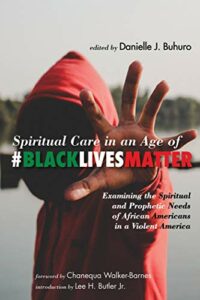 Spiritual Care in an Age of #BlackLivesMatter: Examining the Spiritual and Prophetic Needs of African Americans in a Violent America edited by Danielle J. Buhuro (Cascade) $31.00 – OUR SALE PRICE = $24.80
Spiritual Care in an Age of #BlackLivesMatter: Examining the Spiritual and Prophetic Needs of African Americans in a Violent America edited by Danielle J. Buhuro (Cascade) $31.00 – OUR SALE PRICE = $24.80
Again, this was one of those books that I wished I had the ability to announce to the world a few months ago, but we just didn’t have that many BookNotes opportunities. Now, we are highlighting books that we think you should know about — maybe now more than ever. This is a collected anthology of very up-to-date pieces mostly by people of color, about what we might call pastoral care for at risk and traumatized people of color. Buhuro is an ACPE Certified Educator/CPE Supervisor at Advocate Aurora South Suburban and Trinity Hospitals in Chicago. There is a significant foreword by Chanequa Walker-Barnes who wrote two other books we stock, Too Heavy a Yoke: Black Women and the Burden of Strength (Cascade; $28.00) and I Bring the Voices of My People: A Womanist Vision for Racial Reconciliation (Eerdmans; $24.99.) As far as I know, there is nothing quite like this in print.
This is a thought-provoking book that will be demanding for some readers — yes, it uses critical race theory and it is forthright about the anguishes and angers carried by many African Americans and other minorities, naming them for the trauma that they are. The authors are professionally diverse, including clinical therapists and social workers, caregivers and seminary professors, psychologists and pastors and engaged scholars. It is serious, for professionals in caregiving careers or college professors doing research in these fields. It is fiesty and raw and a vivid call to hear what some who specialize in helping black lives flourish have to say as they analyze their specialty disciplines.
For instance, here are just a few of the 20 chapter — in the first part about “Caring for the Victims of Violence and Social Justice Activism” we have “From Viral to Voyeuristic: When Politic Brutality Videos Turn into Black Death Tourism; Self-care for Black Trauma” by Danielle Buhuro; “Domestic Violence and Pastoral Care in the Age of #BlackLivesMatters” by Sharon ellis Davis; “Creating Circles of Peace: Mindfulness as a Pastoral Response to Health, Education, and Violence in the Black Community” by Marsha Thomas.
In the second section (“Caring for Body and Soul in the Black Community”) there are chapters such as “Rethinking Interpretive Tools for a Liberating Spiritual Care” by Afri A. Atiba; in this section there are several chapters about mental health, about congregations engaged in suicide intervention and prevention, about food oppression in the black community, etc.
Part 3 includes essays under the heading of “Caring for African American Marriages, LGBTQIA Partnerships, and Families.” Here there are chapters about mate selection within the African American community, a moving piece about “The Talk” between black fathers and sons, and then in Part 4 there are several key chapters about caring as chaplains, about institutional settings that may be racist, about the need for CPE among African American clergy. There is a “manifesto” about black spiritual care in hospitals and even an essay about pastoral and spiritual care to African Americans in the United States Armed Forces.
This book isn’t designed for everyone, not even everyone who cares about the trauma of racism and the unique needs of black persons in our culture. But for those who want this kind of fiesty, professional anthology, I don’t know of anything like it.
By the way, I hope to review in greater detail later a new book that is more evangelical in tone, more conventional and less academic, but is another new, rare sort of resource. It is designed to bring the typically very white tradition of spiritual direction to the historic black church and, conversely, to help the typically white contemplative spirituality movement learn from those 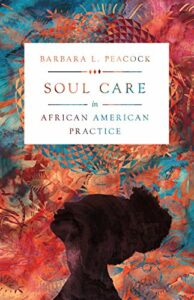 who embody spiritual gifts from the black church. Entitled Soul Care in African American Practice by Barbara Peacock (IVP; $17.00 — SALE PRICE = $13.60) this suggests that “practices of spiritual formation are woven into African American culture and lived out in the rich heritage of its faith community.” I think many of our customers will find it informative and helpful.
who embody spiritual gifts from the black church. Entitled Soul Care in African American Practice by Barbara Peacock (IVP; $17.00 — SALE PRICE = $13.60) this suggests that “practices of spiritual formation are woven into African American culture and lived out in the rich heritage of its faith community.” I think many of our customers will find it informative and helpful.
As Natasha Sistrunk Robinson (author of A Sojourner’s Truth: Choosing Freedom and Courage in a Divided World) comments about Soul Care… “The temptation of Western theological thought and spiritual formation is to ignore or deny the historical contributions of African Americans. Dr. Peacock does a wonderful job of introducing to some and reminding others of the role African American spiritual mothers and fathers have played in shaping the hearts of God’s people and a nation.”
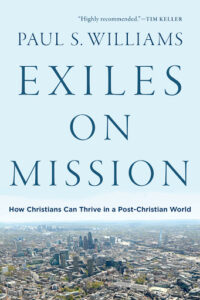 Exiles on Mission: How Christians Can Thrive in a Post-Christian World Paul Williams (Brazos Press) $19.99 – OUR SALE PRICE = $15.99
Exiles on Mission: How Christians Can Thrive in a Post-Christian World Paul Williams (Brazos Press) $19.99 – OUR SALE PRICE = $15.99
As the pandemic spread and the quarantining caused the cancellation of our off-site events, I was asked to do some Zoom and Facebook Live book announcements for groups Beth and I usually serve. From staff training for the CCO to clergy convocations for the UCC to a Bishop’s retreat of Episcopal priests, we have quick shout outs to this at each. This book is so good for so many — drawing on a vivid and largely Reformed worldview that (in the spirit of Newbigin) pushes us to engage culture and think missionally about society, work, economics, and more, if helps us all learn to be “ambassadors of hope in a new Babylon.” This theme of exile is important for all of us in a post-Christian culture, of course, but it is really resonant now, after a period of being exiled from our church buildings, workplaces, favorite social haunts, maybe even our loved ones. The book isn’t about the dislocation we’ve felt this past Spring and Summer but God’s people flourishing on mission even in exile and in hard spaces certain works these days, doesn’t it?
Rave reviews and hearty blurbs on the back are from the aforementioned Tim Keller, our friend Amy Sherman (author of Kingdom Calling: Vocational Stewardship for the Common Good), and Katherine Leary Alsdorf, co-author of Every Good Endeavor: Connecting Your Work to God’s Work — surely one of the top two or three most substantial books in the “faith and work” movement. Williams taught “marketplace theology” at Regent College in British Columbia and is known for the extraordinary ReFrame video curriculum. I can’t say enough about it, it this short space, but it is an excellent read. Similar to last year’s fantastic Symphony of Mission: Playing Your Part in God’s Work in the World by Michael Goheen and Jim Mullins (Baker Academic; $22.99) and along with it, we have now just the absolutely best books for a full-orbed and wholistic cultural theology that is culturally contextualized and sweetly missional, deep, rich, and yet accesible. Highly recommended.
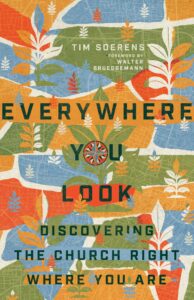 Everywhere You Look: Discovering the Church Right Where You Are Tim Soerens (IVP Praxis) $17.00 – OUR SALE PRICE = $15.99
Everywhere You Look: Discovering the Church Right Where You Are Tim Soerens (IVP Praxis) $17.00 – OUR SALE PRICE = $15.99
You may recall the wonderful book that Tim Soerens co-wrote a few years ago entitled The New Parish: How Neighborhood Churches Are Transforming Mission, Discipleship and Community (IVP; $18.00.) I believe a case can be made that it is more important now, during Covid and the post-pandemic era, than even before. This new one is fantastic as well, offering a deeper dive into some of that hope about caring for place. Everywhere Your Look starts with the (sad but true) necessary reality check for many of us: there will be in the future fresh experiences of church that may be very different than the status quo. Older forms of church may not be sustainable. Lasting congregations, that we now tend to call faith communities, are increasingly being defined by a robust, Biblical ecclesiology that causes us to see ourselves as real communities and as Kingdom agents of what might be called a movement. As it says on the back cover, this book offers “a vision of the church grounded in a grassroots movement of ordinary people living out what it means to be church in their everyday lives.” It is what David Fitch calls “a manifest plea to all who are ready to give up on church” and what Michael Frost (clearly one of Soerens’s own mentors) says is “tender and rousing in equal measure.”
(By the way, I have to say, some of this brings to mind a recent edited collection by some friends of ours, scholars and practitioners of PC(USA) church planting and congregational development called Sustaining Grace that explores “innovative ecosystems” for new faith communities. It was put together by Scott Hagley, Karen Rohrer, and Mike Gerling (Wipf & Stock; $21.00) and we reviewed it in a BookNotes column a month ago.
Everywhere You Look: Discovering the Church Right Where You Are comes with a solid, several page foreword by Walter Brueggemann and it is nearly worth the price of admission to read that. Tim Soerens, though, is the real deal and it is very good to listen to him — even if you bristle at some of his anti-institutional church biases and are not as hopeful as he is about “building collaborative communities” in your neighborhood. He has paid attention to church life and inter-denominational collaborations and shared ministry efforts and he is a significant voice. Drawing on the likes of Alan Kreider’s The Patient Ferment of the Early Church, Soerens guides us towards an agenda that trusts God enough that allows us to be patient, even as we seek the good of our neighborhoods and places and society.
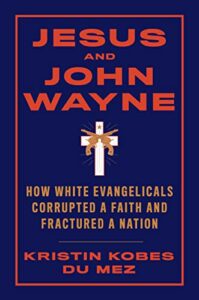 Jesus and John Wayne: How White Evangelicals Corrupted a Faith and Fractured a Nation Kristin Kobes Du Mez (Liveright) $28.95 – OUR SALE PRICE = $23.16
Jesus and John Wayne: How White Evangelicals Corrupted a Faith and Fractured a Nation Kristin Kobes Du Mez (Liveright) $28.95 – OUR SALE PRICE = $23.16
I would love to tell you much more about this; we respect the author immensely. She is a beloved professor of history at Calvin University in Grand Rapids; she herself grew up in the conservative Dutch Reformed faith community – her father was a theology professor at Dordt College in Iowa. So she is both a scholar of conservative American religion and very much a part of it.
A few years ago, by the way, Du Mez wrote a major, scholarly work on Katharine Bushnell and 19th century Christian feminism called A New Gospel for Women published by Oxford University Press ($34.95.) I once quipped that this new book, Jesus and John Wayne, is in a way a continuation of that story, the 20th century push-back against the dignity of women with the intentional celebration of macho-men and what some used to call “muscular Christianity.” The result has not been good and this oddly American expression of faith has had huge consequences for the witness of the evangelical church in the last few generations. And now, there’s, well, you know.
Of the many books out these days wondering how the far Christian right could have possibly gotten so deeply involved with and excited about a hedonistic, divorced, playboy (who has paid hush money to porn stars) — and there are a lot of books as it is just such a unbelievably breathtaking historical development nobody could have seen coming — Jesus and John Wayne is truly one of the most important. Dr. Du Mez is not just looking at the currentextreme leaders of the Trumpian religious right like the bombastic Jerry Falwell Jr. and millionaire Pentecostal Paula White, but she explores Dr. Dobson, Promise Keepers, the purity ring/purity culture movement, the gonzo macho stuff of Wild at Heart. She offers astute and lively observation of much of the material culture of evangelicalism, from Veggie Tales to the Left Behind novels, the rage in anti-Muslim books after 9-11 and so much more, bringing insight about how all of that white evangelical stuff collided, forming a civil religious nationalism that was more than patriotic, but militaristic and nearly idolatrous.
Agree or not with her assessment or conclusions (and I am not prepared to say either, yet) this is a book for anyone who has lived through the past fifty or so years of evangelicalism. From Christianity Today and Billy Graham’s stance on Martin Luther King, to the impact of the cult-like Bill Gothard, from the DeVoss family’s Amway to the celebration of Ollie North, from the partnership of evangelicals with Catholic dynamo Phyllis Schafly to the recent popularity of Wayne Grudem and John Piper’s teaching about traditional gender roles, this book offers a truly wide-ranging account of much that influenced the culture that gave us both Anita Bryant, say, on one hand, and Amy Grant, on another; Pat Robertson on one hand and Francis Schaeffer or Ron Sider on other hands. What a movement it has been, and Du Mez knows it well.
And if you are not part of the evangelical subculture, this will be an ideal guide to learning about what makes it tick, where it all came from, and how it got oddly harnessed to a vision of life that isn’t particular Biblical, but nationalist, militaristic, materialistic and, at worse, racist.
Read these two quotes which capture her thesis and explain why this book is an important bit of American history and why it is so very important now.
Jesus and John Wayne demolishes the myth that Christian nationalists simply held their noses to form a pragmatic alliance with Donald Trump. With brilliant analysis and detailed scholarship, Kristin Kobes Du Mez shows how conservative evangelical leaders have promoted the authoritarian, patriarchal values that have achieved their finest representative in Trump. A stunning exploration of the relationship between modern evangelicalism, militarism, and American masculinity. — Katherine Stewart, author of The Power Worshippers: Inside the Dangerous Rise of Religious Nationalism
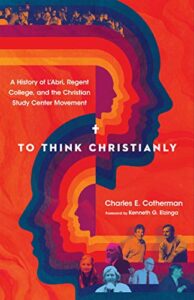 To Think Christianly: A History of L’Abri, Regent College, and the Christian Study Center Movement Charles E. Cotherman (IVP Academic) $35.00 – OUR SALE PRICE = $28.00
To Think Christianly: A History of L’Abri, Regent College, and the Christian Study Center Movement Charles E. Cotherman (IVP Academic) $35.00 – OUR SALE PRICE = $28.00
Before the pandemic and the necessary shut-down this past spring, causing a shift in our business and work flow, we dreamed about having our friend Charles Cotherman do some sort of event, some way we could celebrate this very, very important book that means a lot to us. For many, it is about something that is nearly invisible, an underground movement that you may not have heard of. But for Beth and I, this book captures a stream of evangelical thinking that means very much to us (and is in vivid contrast o the macho militaristic piety described in the book by Dr. Du Mez, above.) It is one of the streams that has made us who we are, and, as I described in detail in the comments exclaiming why we value Richard Mouw’s wonderful study All That God Cares About: Common Grace and Divine Delight, we may not be here doing what we do at Hearts & Minds if it were not for some of the people and movements described in this new book.
To put the start of the story too simply, Francis and Edith Schaeffer were conservative, evangelical Presbyterians — he of Philadelphia blue collar working class stock, she of a more sophisticated, elite family — who, together, concluded that with the rise of the beatniks and the hippies of the mid sixties, and the intransigent, anti-cultural, world-denying tone of American evangelical churches they simply had to create a better expression of Christian truth. They wanted to create a place that would allow seekers and drifters, drop-outs and disillusioned protestors, to hear the whole truth of the Biblical gospel in conversation with the philosophies of the day and a healthy dose of real community and good art. They started an intentional community and drop-in study center in Switzerland and named it L’Abri, promising “real answers to real questions.” Together they would listen carefully to “Sgt. Pepper” and read Dante out loud and follow the line of despair from Nietzche to the painter Francis Bacon or to art-house French cinema. Some of our favorite authors and friends — Bill Edgar, Nancy Pearcey, Paul Marshal, Sharon Gallagher, Steve Turner, Os Guinness, Steve Garber come to mind — had significant experiences there. (Guinness was actually on staff in Huémoz, one of the great influences there for a time.)
As the place became known and Schaeffer’s interesting lectures blending an overview of Western history and philosophy and a call to a relevant but true spirituality, led to books and speaking tours, others caught the vision for somewhat similar study centers and residential communities to attract the unchurched and strengthen evangelicals in making sense of Christianity to an early 70s zeitgeist. I used to visit one such study center with R.C. Sproul who at the time perhaps fancied his Western Pennsylvanian Ligonier Valley Study Center with his lodges and cabins and gardening and multiple, charismatic, well-educated staff akin to Schaeffer’s Swiss L’Abri. Both stood on Reformed faith, drew upon philosophical and cultural apologetics, and encouraged a serious, if tame, activism for social righteousness and cultural renewal.
Sproul in Western Pennsylvania wasn’t the only Christian intellectual wanting to work within the counter-cultural youth movements. Even before him there was New College of Berkeley, with the energetic, Jacques Ellul-influenced David Gill and the incredibly insightful, evangelical hippy community called the Christian World Liberation Front with an underground paper focusing on “lay theological education” called Right On. Eventually as the times changed, they had a marvelous paper called Radix and, eventually, an intense learning community, inspired a bit by the likes of Toronto’s Institute for Christian Studies, called The Crucible.
In Cotherman’s heretofore untold narrative, it is a hop, skip, and a jump from L’Abri and the influence of a reasoned and culturally relevant sort of youthful evangelicalism to learning centers like the New College of Berkeley and The Crucible. And from there, Cotherman connects the dots to the founding of the remarkably generative college in Vancouver, British Columbia called Regent College. To this day it is one of the finest establishments for adult learning out of a mature and balanced evangelical perspective in all the world. With visiting faculty as fabulous interesting as Marva Dawn, N.T. Wright, J. I. Packer, Craig Gay, and so many others, it remains a splendid example of historic faith freshly proclaimed for the living in our times. As those familiar with the courses offered there know, and as Cotherman’s book explains, it was founded by the extraordinary scholar and deeply pastoral leader (himself a bit of a mystic, well versed in the classics of contemplative spirituality) Dr. James Houston. And, yes, Houston knew Schaeffer. As Cotherman documents, Houston had some concerns about Schaeffer’s scholarship and leadership styles which they talked about in correspondance and face-to-face. Fun fact: when Dr. Houston retired from Regent College, his replacement was Eugene Peterson, who moved to British Columbia to become a professor of “spiritual theology” there.
To Think Christianly advances the plot and continues to show overlap and collaboration with other great chapters in this story — chapters about para-church ministries and organizations that we have supported, that have purchased books from us, even, so much so that we almost feel a part of this story, if only in a secondary way. For instance, there are several fabulous chapters exploring the founding of study centers offering a robust and intellectually credible Christian witness near major, secular universities. From Drew Trotter taking leadership of the renowned Charlottesville Study Center at the University of Virginia to Karl Johnson and his remarkable project founding The Chesterton House on the campus of Cornell University in Ithaca, New York, these are stories that show how a missionary movement among university students and faculty emerged with the founding of these intellectually rooted residential communities into what is now a network, a consortium, of such study centers throughout the country.
Further, some of the study centers, or local churches inspired by them, then, formed Fellows programs where post-college young adults gather for intensive discipleship and mentoring, being, formed in vocation and marketplace mission. These many Fellows programs are yet another fruit of this loose network and movement (a fruit that Cotherman does not explore, but surely could have.) What a joy for us to have had connections with the Gotham Fellows out of the Redeemer Center for Faith and Work in New York, the Washington area Falls Church Fellows started by Falls Church Episcopal, now Anglican, the great Pittsburgh Fellows program, the Triangle Fellows in Chapel Hill, NC. These internships and seriously thoughtful Christian formation programs seem to me to be a direct result of the sorts of substantial work documented in this volume.
None of all of this would have existed as they do, Charles Cotherman suggests, rightly I think, if a generation of thoughtful evangelicals — sons and daughter of Issachar, if I can quote 1 Chronicles 12:32 — decades ago, influenced in one way of another by Francis and Edith Schaeffer at L’Abri (and their many books) had not forged into North American settings and founded organizations, networks, collaborations, intentional living houses, study centers and even accredited institutions of higher education.
Above, I recommend the powerful Jesus and John Wayne by Kristin Kobes Du Mez which documents much of the macho foolishness and right wing militarism that pervades much of popular evangelicalism and neo-fundamentalism. Happily, the people documented in this amazing book, To Think Christianly, by Charles E. Cotherman, raise up a different sort of expression of historic, evangelical faith. This is a well-written and inspiring account of some of the streams the flow into contemporary evangelical culture, one that has nurtured us and inspired us. We are glad that Charles did this amazing archival research, conducted so many interviews, offers so much first-hand testimony of the connections between L’Abri and Chesterton House, between Ligonier Valley Study Center and the C.S. Lewis Institute, between the New College of Berkley and the important, on-going Regent College in Vancouver.
We applaud these organizations, unique as they each were, disagreeable as they may have been in some areas, wrong-headed, too, at times, for their dedicated efforts to help followers of Christ live out faith in the complexities of the secularizing, modern world. Each emphasized the life of the mind, but usually not to the exclusion of the wholistic vision of embodied faith, caring about neighborhoods and place, speaking out against injustice and serving the poor as they could.
This stimulating history proves that some people were trying to stave off the shallowness of much evangelical thought and were hoping to offer a counter-perspective to those held captive by ideologies of the far left or right. They really did want to encourage students and public leaders to “take every thought captive” and “think Christianly” about all of life (and they still are!) In this, they honor Schaeffer’s hope to offer a “true spirituality” (as one of this books in those years) put it. They honor the historical relevance of Os Guinness’s book about the Kingdom of God being a “third way” between the poles of culture and counter-culture described in the 1970s book that came out of those years, The Dust of Death (newly reissued as we celebrated at BookNotes in March.) As historian Mark Noll notes, “This well-written and compelling book is a sign of hope.”
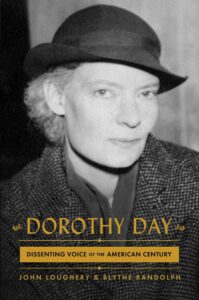 Dorothy Day: Dissenting Voice of the American Century John Loughery & Blythe Randolph (Simon & Schuster) $30.00 – OUR SALE PRICE = $24.00
Dorothy Day: Dissenting Voice of the American Century John Loughery & Blythe Randolph (Simon & Schuster) $30.00 – OUR SALE PRICE = $24.00
In the late winter into the Spring I was telling anyone I could — which, admittedly was not many — that this was my favorite book so far in the new year. It remains one of the most remarkable books I have ever read. I’ve read a bit about and by Dorothy Day but this filled in so much detail with such good prose it not only made me glad to have learned so much, but it inspired me to turn to a few other biographies, relearning a new appreciation for the art form and the scholarship and the joy of reading a top-class historical biography. I am a huge fan of this book and glad it got some very prominent reviews in major newspapers and journals.
Loughery and Randolph did a superb job in both focusing on the remarkable conversion of this far left social activist in the early twentieth century (who famously cavorted with the likes of Eugene O’Neil and other intellectual and bohemians and artists) into a socially active but devout Catholic, known for her Catholic Worker “houses of hospitality” for the poor and homeless and her world-renown Catholic Worker “penny a copy” newspaper. She was a voracious reader and writer and, eventually, tireless public speaker and while this volume explores her life and faith and piety it does so with a wide angle lens looking at what some call “the American Century.” Yes, Loughery & Randolph are excellent biographers but they are also astute and lively historians. I very highly recommend this big book and assure you that you will learn things, important things, that you did not know, and for many events — strikes in the 30s and anti-war activities in the 40s and Southern civil rights work in the 50s and anti-nuclear weapons protests in the 60s, and on and on — you will have a front row seat. And not just any front row view, but a profoundly religious, decidedly Christ-centered one. From the opening story of Dorthy being arrested as an old woman in solidarity with Latina migrant workers in the fields of California, you realized this is going to be one great read.
I was asked to write a review of this book for the Pittsburgh Post Gazette and it was a great honor. There have been CW houses in Pittsburgh and Dorothy herself had a spiritual director who lived there, so she (unknown to most) visited there from time to time. (She had been also there as a young woman to show solidarity and report on the coal strikers and the steel mill conditions early in the century before her conversion and had affection for the scrappy place.) So I wrote this piece, shorter than I wanted, and didn’t tell much about the dramatic last half of the book — Dorothy’s relationship with the Cesar Chavez and the Berrigan brothers, the shift in the communities that formed in her name (some no longer serious Catholics) and the struggles with her dream to have farms, as well, playing a part in a renewal of local agriculture and radial agrarianism. And, oh my, the poignant stuff about her strained relationship with her daughter and grandchildren. Dorothy Day moves from the epic sweep of history to the tender and anguishing human story of a hurting family, caught up in radical service and church politics, fame and yet no fortune. And now, playing catch up here in this catch-all column of the dozens of books I wanted to review earlier in the year, I must, again, postpone.
This Protestant reader was thoroughly taken with this excellently drawn story of a contemporary Catholic saint. It is without doubt one of the best books of the year and a must-read for anyone who wants to know more about the remarkable, daring, one-of-a-kind, Dorothy Day. Or who wants extra insight about the controversies and causes that pervaded the 20th century. Please, please, click on this link and read my short review of Dorothy Day: Dissenting Voice of the American Century from the Pittsburgh Post Gazette. Send it around to others if you can — I could love to get some orders for this extraordinary historical survey and detailed, thoughtful biography. What a book!
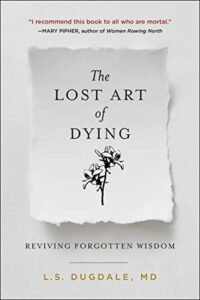 The Lost Art of Dying: Reviving Forgotten Wisdom L.S. Dugdale, MD (HarperOne) $27.99 – OUR SALE PRICE = $22.39
The Lost Art of Dying: Reviving Forgotten Wisdom L.S. Dugdale, MD (HarperOne) $27.99 – OUR SALE PRICE = $22.39
When this book came out we hardly had time to think, let alone read tenderly wise books about death and dying. Our business was struggling with lack of staff and yet a surge in complicated mail orders, causes us to work long hours. Very late one night I was exhausted, thinking of the worst — praying for people we knew who had died or were dying of Covid-19. Lifting up friends in New York who were devastated. Holding back our fears of our own future as a business possibly reaching an end It is fair to say many of us have been melancholy at best, often worried and sad these hard days. And many of us know people who were sick.
That night I picked up this book about the morbid subject of dying. Written by a doctor, it offers insights discovered, the first pages tell us, from a once popular document created (get this) during the black death; the famous plagues of the 1400s. It was a document on dying well, but, in fact, it is a book about living well. Dr, Dugdale, we learn, discovered the medieval Latin texts on how the living were to prepare for a good death. This notion from the late Middle Ages, was called ars moriendi — the art of dying — and it made clear that “to die well, one first had to live well.”
And with that, I was hooked. As she was as she gleaned much for this ancient wisdom and added what she learned from her best medical training. This is not quite like Being Mortal by Atul Gawande but it is in that ballpark, with a bit of the the writerly grace of When Breath Becomes Air thrown in.
As Siddhartha Mukherjee (the Pulitzer Prize winning scholar of the extraordinary book about cancer, The Emperor of All Maladies) writes, “In this profound and compassionate book about death and its nearness, Dugdale demystifies one of the essential mysteries of our time.” That mystery, it seems to me, is not just about the mystery of mortality, but the question of how and why we have so medicalized life and death that we have lost touch with the very meaning of our lives and the habits of dying well. Why do we do this to ourselves? The opening sequence is vivid and painful as the harsh stuff of prolonging life unfolds with caring family (not to mention dying patient and medical staff) traumatized by the unpleasantness of the extreme interventions. And, within the opening pages, the Christian faith comes in to play. I found out later that this author is, in fact, a Christian believer who is active in her own faith community. She is known as an extraordinary person, caring and kind. In fact, Dr. Abraham Nussbaum, author of the wonderful book about reforming medicine, The Finest Traditions of My Calling, says, “When I lay dying, I hope I will have a doctor like Dr. Dugdale at the bedside.”
Curiously, here in this mainstream book not pitched to a religious audience, is an endorsing blurb by a well known New York pastor and evangelical theologian, one aquatinted with illness, himself, Rev. Timothy Keller:
Lydia Dugdale’s The Lost Art of Dying proves that there is often nothing more relevant to our present cultural moment than the wisdom of the past — in this instance, on the subject of how to face death. The book is based on a great deal of painstaking scholarship but is written in the most accessible style. It will not only be of enormous help to people facing their own death or the death of a loved one, but also to professionals in various fields who attend the dying.
Besides walking us through the various points and teachings of the ars moriendi. She tells lots of stories, offers important contemporary insight, but like Keller says, draws on the wisdom of the past. And she does all this with a deft touch — as poet and Christian thinker, Yale professor Christian Wiman says of The Lost Art of Dying, it is a “lucid, learned, humane, and utterly necessary book.”
One final delight for all of us — and especially for anyone local to us here in York County. Dr. Dugdale brilliantly commissioned an artist to do pen and ink drawings, original creations to go along with each of the chapters. The art pieces that form a wonderful, major appendix to the book, are done by York, PA visual artist Michael W. Dugger. The artwork is modern and yet not odd, moving without being sentimental. (If you know Barry Moser’s work, it has that sort of look, I’d say, which is a huge compliment.) This is good, nuanced art, with each black and white illustration accompanied by a one page reflection/explanation by the artist. It makes a significant contribution to the book and we look forward to discovering more of Mr. Dugger’s provocative work. Well done.
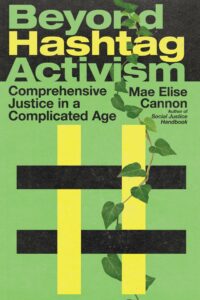 Beyond Hashtag Activism: Comprehensive Justice in a Complicated Age Mae Elise Cannon (IVP) $22.00 – OUR SALE PRICE = $17.60
Beyond Hashtag Activism: Comprehensive Justice in a Complicated Age Mae Elise Cannon (IVP) $22.00 – OUR SALE PRICE = $17.60
Over and over as the pandemic season evolved into the seasons of protests, in part over the murder of George Floyd with many people taking to the streets (usually with masks and peaceful) to protest systemic racism and police brutality, I kept wishing I could find a way to announce this book. Why our work flow and limits here precluded that is another story but, sadly, I suppose, the need for this book has only grown in recent months. We need to be informed. We need to amp up our daily citizenship initiatives. We need to live out our faith and better in and for our world. As important as this upcoming election is, politics is more than about elections and voting, and doing justice (as the Bible demands of us) is often more than mere politics. We can be agents of change in so many venues and ways and we can be socially and politically engaged in every season. The current election year drama just makes it that much more urgent that we know our stuff and live out our faith by doing what we claim we want our elected officials to stand for. Help get out the vote, yes. But study up and learn about ways to more actively engage the issues of the day.
Enter Mae Cannon, here with an almost one-stop shop, giving you in one simple book enough information to make you the most informed person in your neighborhood, no doubt. In one place she will help you help others with talking points and ideas for activism on any number of causes, concerns, topics, and issues. This book is a handbook like no other and I very highly recommend it. I really, really hope you buy it.
Mae offers this practical resource which is a bit more in-depth and user-friendly, I think, but a good advanced companion to her 2009 Social Justice Handbook. It emerges out of her growing awareness that for some of us, we think offering a pithy statement on twitter or using a hashtag somehow makes us a social justice warrior. Nope, not quite. Of course, for some of us who are homebound or with exceptional limitations, this may actually be the best way to engage and, heaven knows, we need wise, thoughtful, kind, and well informed people on line and in the social media spaces. So she isn’t disparaging those called to stand for justice in contemporary media venues. She is not against hashtags. But, surely, she is right that most of us must embody our deepest values, live into the work of public justice, actually do something concrete (usually in concert with others) to get policy enacted or reformed. We must get off line and into the streets. Liking protest pictures and hashtags and facebook memes can be part of that, for sure, but we need more. Much more.
But first, we have to know what we think, know some facts about the complex issues, and learn a bit about how the system works. Beyond Hashtag Activism helps us wonderfully.
The first couple chapters are very informative and will help you solve this problem of knowing how to begin. It clearly explains a bit about advocacy and justice work and what that may entail. She looks briefly at different aspects such as prophetic action, social relationships and concerns, economic advocacy, spirituality, and politics, as such. What does it look like to take up “legal advocacy” say, or “spiritual advocacy”? What are the “four best practices” for social change agents? She names them all and while some experienced activist might quibble, or wish for other good points, it is an excellent overview and great starting place. (For those who have started this work, this portion is still a great clarifying reminder of what we might already know, but need to be reminded of. It’s well worth reading and re-reading.) I can’t say enough about her succinct, inspiring and Biblically-informed framework and rubrics, so to speak.
(By the way, Mae has tons of experience — on the streets, doing face-to-face social outreach and service ministry and she has done bigger level organizing and even macro-level legislative advocacy. She has expertise in local issues as well as considerable global connections. She previously served as the director of advocacy for World Vision US on Capitol Hill in Washington and is currently the Executive Director of Churches for Middle East Peace. Among other volumes, she edited Land Full of God which explores contemporary issues in the Holy Land.)
She doesn’t cover everything in this Beyond Hashtag Activism book, but she offers a lot. Here’s the basic table of contents so you can see what she teaching us; there are great discussion questions after each section to help individual readers or small groups to clarify what they think and to prayerfully discern next steps.
Part 1. Biblical Justice and the Gospel
1. God’s Justice and Prophetic Advocacy
2. Politics and the Gospel
Part 2: Poverty
3. Global Poverty
4. Domestic Poverty
Part 3: Race
5. White Supremacy and American Christianity
6. Racial Violence, Police Brutality, and the Age of Incarceration
7. Global Immigration and Battles at the Border
8. Divisions of Race and Ethnicity Around the World
Part 4: Gender
9. #MeToo, Women in the Workplace, and Women in the Church
10. The Liberation of Women Around the World
Part 5: Twenty-First-Century Divides
11. Marriage and Sexuality
12. The Middle East, Israel, and Palestine
13. Religious Freedom
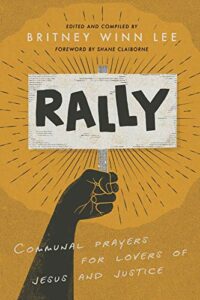 Rally: Communal Prayers for Lovers of Jesus and Justice edited and compiled by Britney Winn Lee (Upper Room/FreshAir Books) $16.99 – OUR SALE PRICE = $13.59
Rally: Communal Prayers for Lovers of Jesus and Justice edited and compiled by Britney Winn Lee (Upper Room/FreshAir Books) $16.99 – OUR SALE PRICE = $13.59
I so wish we could have gathered together at some of our clergy events this Spring — I’m thinking of you, Penn South-East and North-East Conferences of the UCC, at least, and the Episcopal Diocese of Pennsylvania, and the conferees of the annual Mercersburg Society — because I know you’d have found this exceptionally useful. It’s one I would have featured in my little up-front announcements. And I would have had some fun reading with great gusto this clever quote from our friend Shane Claiborne, who wrote the foreword.
As Shane Claiborne says,
This is not your grandmother’s prayer book. Or if it is, I would really like to meet your grandmother.
There is a cry for action here, and a comfort for our anxious souls. It is a guidebook full of prayers and litanies and liturgies for all sorts of justice issues and deeply social concerns. It is mostly pretty conventional theologically but pressing our historic convictions into fresh new ways to offer solidarity with the most vulnerable and to evoke God’s guidance as we lament, celebrate, repent and resist. As we lift our hearts to the God who is there, this books helps the socially-active (or at least those who care) to new voice, to express our outrage and longing.
Britney Winn Lee, who directs an arts program in Shreveport, Louisiana that builds community among the hurting, pulls together here remarkable prayers and litanies penned by pastors, activists, scholars and writers from across the Christian community. Contributors includes, among others, Kaitlin Curtice, Rachel Hackenberg, Dee Dee Risher, Austen Harke, D.L. Mayfiield, Osheta Moore, Bruce Reyes-Chow, Brandan Robertson, Jonathan Wilson-Hartgrove, Patrice Gopo, and Sandra Maria Van Opstal.
The prayers include good words about topics such as racial and gender inequality, economic disparity, white privilege, abuse of power, violence, mistreatment of migrants and refugees, and prayers for those pushed to the margins of society, including those who identify LGBTQIA. Some of the prayers are artful and gentle, liturgically sound, and others are loud and raw. Some are quite suitable for a Sunday morning worship service, others are designed for meetings or events.
Rally: Communal Prayers for Lovers of Jesus and Justice is done in cooperation with The Academy for Spiritual Formation and we are grateful. I suppose not every prayer will be used by every faith community but it is a very useful resource to have. If you are a worship leader or planner, a small group leader or pastor, you should order one of these right away.
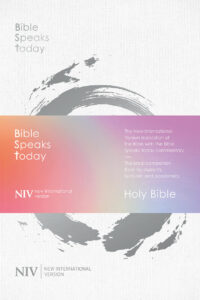 The NIV Bible Speaks Today Study Bible (IVP-UK) $50.00 – OUR SALE PRICE = $40.00
The NIV Bible Speaks Today Study Bible (IVP-UK) $50.00 – OUR SALE PRICE = $40.00
We have gotten so many new Bibles into the shop in the past half a year I suppose one of these days I should do a BookNotes just highlighting newly released editions, updated classics like the updated Life Application Study Bible notes in the NLT or NIV and the brand new updated NIV Study Bible, the recent NET Study Bible, the CEB Navigation Bible, the phone or tablet enhanced Filiment Bible in the NTL, the great, new selections of NRSVs and some wonderfully made new Roman Catholic editions. And,of course the never-ended new, excellently crafted editions of the ESV put out by Crossway.
But I was very excited when this NIV Bible Speaks Today study edition came out late last Spring. Let me say why.
You see, when folks write to ask us for our best suggestions for Bible commentaries (go ahead, ask us our favorites on Luke or Leviticus or Micah or Matthew) and we will inevitably suggest one of the paperbacks in the solid and reliable “Bible Speaks Today” series. The title of each in the BST series starts with the phrase, The Message of (enter the book of the Bible) and they are almost always workmanlike and useful, not too academic, but serious enough that you get out of it what you want in a commentary. They are mid-level, so to speak, aware of and sometimes engaged with the critical issues, but with an evangelical tone that wants to respect the text among the gathered people of God, helping us understand the passage’s relevance and how we might hear God speak. There are even discussion questions in the back of each of these books in this fine commentary series. And so, we recommend them often.
What the Bible Speaks Today Study Bible brilliantly does is to take pertinent and helpful excerpts from the many volumes of the commentary series and splice them into the pages of a sturdy NIV hardback Bible. So this is a new study edition that includes helpful insights from the authors of the BST commentaries. What a great idea!
Who are these authors? Fair enough. Many are names you may know not, but it might be useful to know that John Stott was the original chief editor of the New Testament and he did several, and J.Alec Moyter edited the Old Testament. Their authors include balanced British evangelicals and US scholars and preachers, as well. They include men and women from a variety of denominations, all with exceptional training and credentials, authors like Joyce Baldwin, Michael Green, Raymond Brown, Derek Kidner, Christopher Wright, and more. I am not alone in often suggesting these paperback volumes — Tim Keller is known to have once quipped that they were his own favorite go-to set.
Anyway, this new (white) hardback Bible is a great resource. It is a nicely made, no-nonsense study Bible with some of best evangelical scholars weighing in, page by page by page. And, there 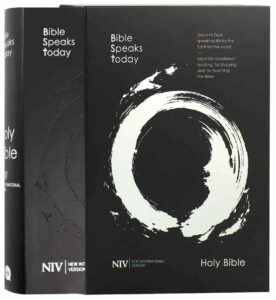 are study questions included, making this a really useful tool for personal devotions but also for leading small group Bible studies and conversational classes.
are study questions included, making this a really useful tool for personal devotions but also for leading small group Bible studies and conversational classes.
By the way, there is also a nice, black leather edition boxed in a handsome slipcase that sells for $70.00.
Our 20% off sale price on that one makes it just $56.00.
+++
Thanks for caring about good books, now more than ever, we are grateful. Send us an order by clicking on the ORDER link below. That will take you to our secure order form page where you just type in what you want. We’ll reply promptly and confirm everything.
Do let us know if you’d rather have us send the order the least costly way (US Postal Media Mail) which can be slow. For one or two books that is usually about $3.25; a bit extra for more books, of course. Some people request the speedy US Postal Priority Mail. For about $7 or so for one book, it is as quick as UPS and a whole lot cheaper. Do, please, let us know your preference.
BookNotes

SPECIAL
DISCOUNT
20% OFF
ANY BOOK MENTIONED
+++
order here
this takes you to the secure Hearts & Minds order form page
just tell us what you want
inquire here
if you have questions or need more information
just ask us what you want to know
Hearts & Minds 234 East Main Street Dallastown PA 17313
read@heartsandmindsbooks.com
717-246-3333
